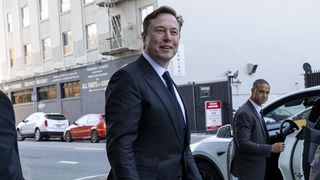As Tesla becomes a bigger, more mature company, it’s increasingly doing things by the book — rather than going against the grain.
Why it matters: Tesla has long stood head and shoulders above the crowd in the electric vehicle industry, effectively directing the current.
- Now, the company is increasingly flowing with the current — and that means it’s looking more and more like a traditional automaker as it grapples with demand challenges, increased competition and choppy market conditions.
State of play: In its fourth-quarter earnings on Wednesday — Tesla reported record profit and revenue — the company signaled that it’s stepping back from some if its high-flying tech company ways:
- It’s juicing demand by lowering prices, not unlike how traditional automakers use incentives to boost sales.
- It’s emphasizing the need for cost prudence, not unlike how mature automakers are constantly looking to trim the budgetary fat.
- It announced plans to move away from its tradition of bunching vehicle sales toward the end of each quarter — a strategy it often deployed to meet or exceed sales targets, but which had a punishing effect on workers who had to scramble to deliver vehicles. (Traditional automakers don’t drastically ramp up sales efforts at the end of each quarter.)
The impact: Tesla’s recent round of price cuts — averaging $10,000 per vehicle in the U.S., according to Evercore ISI — have stoked demand, CEO Elon Musk said on the company’s earnings call.
- “We currently are seeing orders at almost twice the rate of production,” he said. “Price really matters.”
- He added that he could envision Tesla making 2 million vehicles in 2023 — compared with 1.37 million in 2022 — if the world avoids major disruptions.
Keep in mind: Tesla kicked off the EV revolution — and Musk has long stated that his goal was to achieve sustainable energy for the world, even praising competitors who join the mix.
- Now it’s happening: competition is heating up from the likes of General Motors, Ford, Volkswagen, Hyundai, Rivian and Lucid.
- In the U.S., Tesla’s share of new EV registrations in November 2022 (the last month available) was 57.1%, down from 77.8% in November 2021, Axios’ Joann Muller reports.
Where Tesla is not so normal as an automaker is in Musk’s stature as a lightning-rod for controversy — the company’s image has sagged since he announced he wanted to buy Twitter.
- But Musk suggested he’s not concerned about his Twitter leadership affecting Tesla, and gave no indication that he would turn over the reins to anyone else anytime soon.
- “Let me check my Twitter account,” he said. “I’ve got 127 million followers, and it continues to grow very rapidly. That suggests that I’m reasonably popular. I might not be popular by some people, but for the vast majority of people my follower account speaks for itself.”
- He added that “Twitter is actually an incredibly powerful tool for driving demand for Tesla.”
What’s next: More products, which analysts say are crucial because Tesla’s vehicle lineup is aging.
- Musk said the company’s long-awaited Cybertruck would begin production as soon as this summer.
- And the company said it will provide “additional details” about “our next generation vehicle platform” on March 1.





